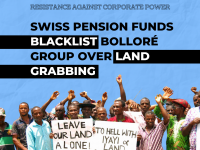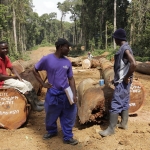Swiss Pension Funds Blacklist Bolloré Group Over Land Grabbing

📸 Protest against Okomu Oil Palm Oil, Nigeria. © Okpamakhin Initiative
Palm oil and rubber plantation company Socfin has been accused of land grabbing in Cambodia, Cameroon, Côte d’Ivoire, Liberia and Sierra Leone. Activists targeted the Bolloré Group (Socfin’s second biggest shareholder) to demand change, resulting in the company being placed on a watchlist by Switzerland’s largest public pension funds. After negotiations failed, the funds blacklisted the company.
“It is a very important step and a powerful sign that an independent advisory group takes a stand on this company based on years of reporting from communities and their allies. It sends a strong message that someone is listening to these voices — at one of the centers of financial capitalism.” - Silva Lieberherr, Bread for All.
Socfin
Socfin controls around 400,000 hectares of land across the world (according to 2020 data), which it uses to grow commodities like palm oil and rubber. The company has been accused of paying bribes as well as avoiding paying taxes in Africa, after it claimed that a sixth of its 2020 revenue came from Europe despite the fact that the company has no land holdings on the continent.
The Bolloré Group
Paris-based conglomerate Bolloré Group owns companies from a broad range of industries ranging from music to batteries to oil pipelines. It is the second-largest shareholder of Socfin, after the family of Socfin’s CEO. It has aggressively sued journalists and news outlets like Basta! Mag and France Inter for reporting on the company’s alleged human rights violations.
Human Rights Violations
In Liberia, a Socfin subsidiary was accused of grabbing over 4,400 hectares of land after bulldozing villages close to its concession area in 2010. Local residents also reported intimidation and sexual harassment. In Cameroon, the Bolloré Group was ordered to pay a €140,000 fine after a 58,000-hectare palm oil plantation that it had invested in was found to have impacted the fertility of surrounding lands. In Cambodia, 80 farmers sued the Bolloré Group for taking over their ancestral lands.
“I do not understand how the Bolloré Group can make billions in profits in Africa while poverty remains widespread and people are unable to feed themselves!” - Lucien, from the Democratic Republic of the Congo.
“This company came to invest in my village, but they did not respect the law. They launched their project before reaching consensus throughout the village. I demand my land back.” - Soang Prou, Representative of the Bunong ethnic group from Cambodia.
Community Victory
Local communities across Africa and Asia impacted by Bolloré’s land grabbing practices created the International Alliance of Local Communities of Socfin-Bolloré Plantations in 2013 and launched a series of petitions, protests and lawsuits. They attracted the attention of the Swiss Association for Responsible Investments (SVVK), a collective of Switzerland’s largest public pension funds (with US$329 billion in assets) which opened a dialogue with the Bolloré Group. After years of discussion, SVVK announced it had made no progress, and recommended that its members divest from the company.
“[T]he Bolloré Group...reiterates that it is only a shareholder of Socfin ...Therefore the Group cannot be held directly responsible for actions or decisions taken by Socfin...However, the Bolloré Group carries out its duty of vigilance...[T]he Group...accept[ed]...mediation with the NGOs Sherpa before the French National Contact Point, on the Cameroonian plantation Socapalm.”
This is #68 in our series of Instagram infographics on resistance against corporate power.
Click here to see the full post on Instagram.
📸 Protest against Okomu Oil Palm Oil, Nigeria. © Okpamakhin Initiative - https://www.oaklandinstitute.org/tell-un-no-more-contracts-bollore-group



